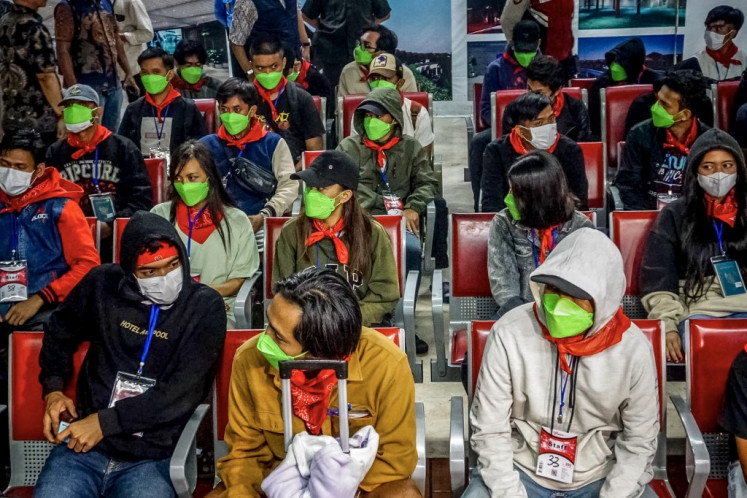Popular Reads
Top Results
Can't find what you're looking for?
View all search resultsPopular Reads
Top Results
Can't find what you're looking for?
View all search resultsEditorial: Revisiting the mining law
What the domestic and foreign investors had dreaded after the 2009 Mining and Coal law was enacted after more than three years of squabbling in the House of Representatives, has taken place
Change text size
Gift Premium Articles
to Anyone
W
hat the domestic and foreign investors had dreaded after the 2009 Mining and Coal law was enacted after more than three years of squabbling in the House of Representatives, has taken place.
The combination of inadequate institutional capacity, greed and corruption has resulted in the issuance of thousands of overlapping mining permits which contravened other laws, especially those regarding forestry and the environment.
The philosophy of the law was politically welcomed because the legislation devolves the authority for awarding mining licenses, outside oil and natural gas, to regional administrations (mostly regents). That was considered the best way of ensuring that natural resources are managed to serve the best interests of the local people.
Politicians in the House imagined the new legislation would better serve national interests, as it limits areas of exploration to 100,000 hectares, and cuts the validity of mining operations from a maximum of 70 years to 20, with two possible 10-year extensions.
Mining firms were expected to be more responsible, because, different from a contract of work, which integrates permits for all stages of mining operations, the new law requires companies to seek separate permits for each phase of mining activity – from exploration to feasibility studies and construction of production facilities. Mining firms must also process all mining products locally into metal starting in 2014.
But as more than 5,000 legally-flawed mining permits have been issued, many now question whether the decentralization of mining permits, mostly to regents, is in compliance with the 33rd article of the Constitution, which stipulates that the land, the waters and the natural resources within shall be under the powers of the state and shall be used to the greatest benefit of the people.
The shorter mining permits seem to have prompted reckless over-exploitation of resources, as can be seen in the exponential increase in unprocessed mineral exports over the past two years: nickel ore exports rose eightfold to 33 million tons in 2011, iron ore sevenfold to 13 million tons, copper more than tenfold to 14 million tons and bauxite fivefold to 40 million tons.
What makes everything even more murky, and causes legal black holes, are two contradictory provisions in the new law. One of them states that the sanctity of contracts of work in mining issued before the new law will be fully honored, but another provision stipulates that such pre-existing contracts must be adjusted to the provisions of the new law.
The Energy and Mineral Resources Ministry is now reviewing more than 5,000 legally defective mining permits, and has forced mining companies to be more serious in processing their minerals or metals locally by imposing export taxes on unprocessed mineral exports.
Such a piece-meal solution, let alone the issuance of ill-thought policy instruments as the surcharge on unprocessed mineral exports, is not effective in addressing the imbroglio that has been gripping the mining industry over the past three years.
The problem is that the central government itself took almost two years to prepare all the derivative regulations to implement the 2009 mining law. Hence, the law has been in full-fledged enforcement for only about two years now, while the implementation of many of its provisions on processing industry require more than three years of preparation and five years for construction.
In fact, it will take more than three years to increase the technical competence of district or regency administrations to enforce the law, and much longer for firms to plan and build smelters, which requires a huge amount of low-cost energy to be feasible.
It is thus a matter of urgency that the central government, regional mining chiefs and mining companies, sit down for an overall review of the mining law and make whatever adjustments are needed to make it politically and commercially enforceable.










